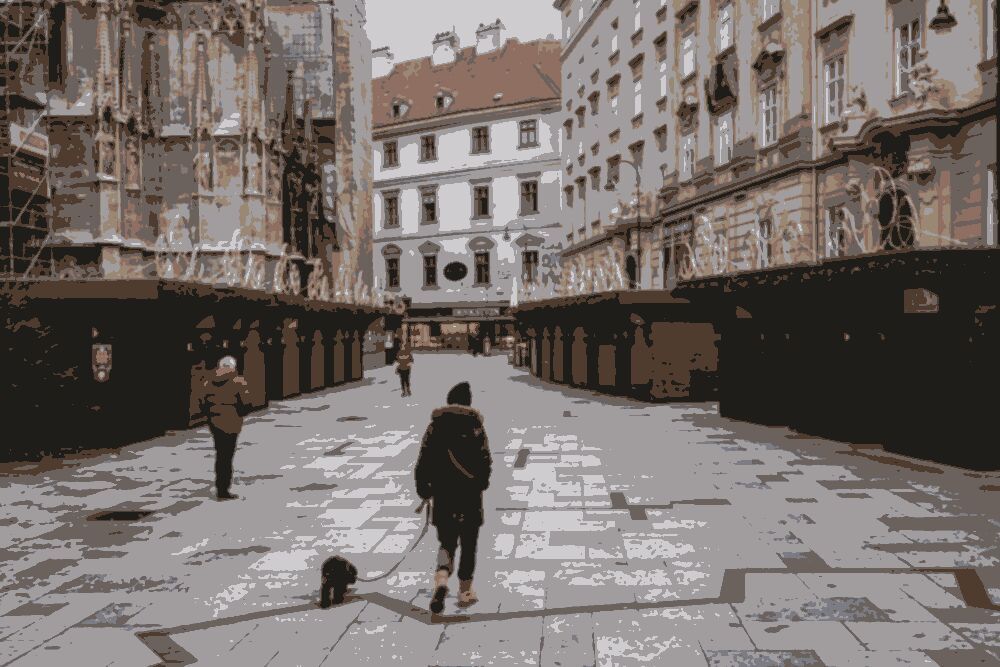Illustration by Mia Clement
Austrian Chancellor Alexander Schallenberg has implemented a nationwide lockdown for the unvaccinated, meaning they must stay at home except for key work and buying essential goods, though the measures exempt children under 12 and anyone who has recently recovered from the virus.
The lockdown started on Monday 15th November and will initially run for 10 days, with the possibility of an extension, and is expected to act as a ‘firebreak’ amidst the soaring case rates among the unvaccinated. While the national average seven-day infection rate stands at 800 per 100,000, this glosses over the differences between the vaccinated and the unvaccinated: the rate is only 383 in the vaccinated population, but an alarming 1,734 among the unvaccinated.
The measure comes in response to the growing pressure on Austrian hospitals, the surge of COVID-19 cases across Europe and the potential for a fourth wave, and the stubbornly low vaccination rate of 63.9%, which is among the worst in the European Union. Since the announcement, there has been a spike in vaccine uptake: 7,653 vaccines were administered the day before the lockdown went into force, compared to only 4,029 a week prior.
This means the lockdown will affect around 2 million out of the total population of 9 million.
There have already been several sets of restrictions on the unvaccinated population, including bans from entertainment and hospitality venues.
Questions remain about how this lockdown will be enforced, and the only concrete measures announced so far are random checks of vaccination status in public spaces by the police, with fines issued to those either refusing to participate or breaking the lockdown.
There have already been protests in Vienna against the lockdown, labelling it unconstitutional and discriminatory, and the far-right Freedom Party of Austria have called for a demonstration on Saturday 20th in the centre of Vienna. They say the new rules will create a second-class of citizens and take away civil liberties.
The conservative-led government, however, has said that “the lockdown is not an end in itself, but protects the health of everyone”, and had previously warned that they would not force a lockdown on the whole country to protect just the unvaccinated.
The government has simultaneously launched a publicity campaign encouraging booster jabs, citing Israel to show that a high rate of booster jabs can break a potential fourth wave before it causes too much damage.
Chancellor Schallenberg urged the country in a speech to book a date for the booster jab and said, “You aren’t doing it for us, or for political reasons, but for yourself, your community, your family, your colleagues, and your friends.”
However, the states of Salzburg and Upper Austria, both also run by conservative governors, have on Thursday implemented a full lockdown.
This is far from the ideal start to Schallenberg’s premiership. Schallenberg, previously foreign minister, was a close ally of the previous Chancellor Sebastian Kurz, and was chosen to succeed him after Kurz was forced to resign having been embroiled in a corruption scandal.
The fourth wave has not just hit Austria, however, and cases are rising all across the EU, with more new cases reported on the 22nd November than on any other day during the pandemic: 271,990.
This has led ever more countries to impose similarly extensive restrictions. The Czech Republic and Slovakia have also entered lockdowns for the unvaccinated, while Jens Spahn, interim German health minister, has warned that by spring everyone will be either “vaccinated, recovered or dead”.
Nor is the outbreak confined to Central Europe: Greece has restricted certain indoor spaces, such as gyms and cinemas, to those who can show proof of vaccination, while even Sweden, which has been cautious to impose large-scale restrictions, is considering making vaccination passports a condition for attendance at large public events.
Austria has also re-imposed travel restrictions, a move it has made repeatedly throughout the course of the pandemic, an issue which caused significant strife between EU member states and the European Commission in June 2021.
The other major question is how this will impact the political situation in Austria, which has been turbulent for some years now, since the collapse of the ÖVP-FPÖ coalition (the conservative, and far-right parties respectively) in 2019.
Since then the conservatives have governed with the Greens, though the coalition has been tenuous. In October, the Greens threatened to pull out of the coalition and vote for no-confidence in the government unless the then Chancellor Kurz resigned, a move which the ÖVP then agreed to.
Part of the reason for such a low vaccination rate may simply be a lack of trust in a government that has been rocked by scandal after scandal – from Ibiza-gate in 2019, in which the leader of the FPÖ was filmed offering government contracts to a woman he believed to be related to a Russian oligarch, to the flurry of allegations surrounding Sebastian Kurz, including that he ‘bought’ favourable news coverage from a tabloid newspaper using public money, perjury, and giving his friends influential publicly-appointed jobs.
However, it does not seem the decision will impact Schallenberg too heavily. The Greens are fully supportive of the new measures, and although the main opposition party, the left-wing SPÖ, have questioned its constitutionality and criticised the coalition for failing to prevent the rise of cases in the first place, they are unlikely to win over enough votes to prevent the lockdown going ahead, as the government is relatively united and has a majority in both chambers. Indeed, the SPÖ has even called for the acceleration of the local lockdowns in Salzburg and Upper Austria.

